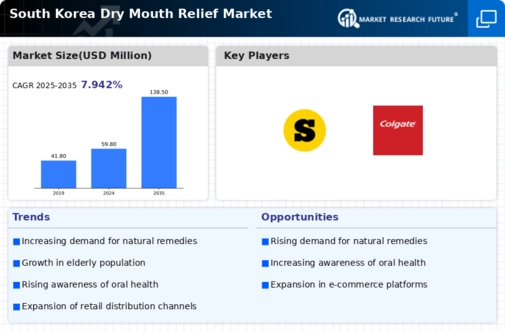Growing Aging Population
The aging population in South Korea is a significant driver for the dry mouth-relief market. As individuals age, they often experience a decline in saliva production, leading to dry mouth, also known as xerostomia. This condition can result from various factors, including medication side effects and age-related health issues. According to recent statistics, approximately 30% of older adults in South Korea report experiencing dry mouth symptoms. This demographic shift is likely to increase the demand for dry mouth-relief products, as older adults seek effective solutions to manage their symptoms. The dry mouth-relief market is thus poised for growth, as manufacturers develop targeted products to cater to this specific consumer segment.
Increased Focus on Oral Health
There is a growing emphasis on oral health and hygiene in South Korea, which is driving the dry mouth-relief market. Public health campaigns and educational initiatives have raised awareness about the importance of maintaining oral moisture and the potential complications associated with dry mouth. As consumers become more informed about the risks of untreated xerostomia, including dental decay and gum disease, they are more inclined to seek out dry mouth-relief products. The dry mouth-relief market is responding to this trend by introducing innovative formulations and delivery methods, catering to the evolving preferences of health-conscious consumers.
Innovative Product Development
Innovation in product development is a key driver for the dry mouth-relief market. Companies are increasingly investing in research and development to create new formulations that provide effective relief from dry mouth symptoms. This includes the introduction of natural ingredients, sugar-free options, and products designed for specific consumer needs, such as those with sensitive teeth or allergies. The dry mouth-relief market is witnessing a trend towards personalized solutions, which may enhance consumer satisfaction and loyalty. As competition intensifies, companies that prioritize innovation are likely to capture a larger market share, further propelling the growth of the industry.
Expansion of E-commerce Platforms
The rise of e-commerce platforms in South Korea is transforming the way consumers access dry mouth-relief products. Online shopping offers convenience and a wider selection of products, allowing consumers to explore various options without geographical limitations. Recent reports suggest that e-commerce sales in the health and wellness sector have increased by over 40% in the past year. This shift is likely to benefit the dry mouth-relief market, as manufacturers and retailers leverage online channels to reach a broader audience. Enhanced digital marketing strategies and targeted promotions can further drive sales, making it easier for consumers to find and purchase effective solutions for dry mouth.
Rising Incidence of Chronic Diseases
The prevalence of chronic diseases in South Korea is another critical factor influencing the dry mouth-relief market. Conditions such as diabetes, hypertension, and autoimmune disorders often lead to dry mouth as a side effect of medications or the diseases themselves. Recent data indicates that nearly 25% of the South Korean population suffers from at least one chronic illness, which correlates with an increased need for dry mouth-relief solutions. As healthcare providers recognize the importance of addressing oral health in patients with chronic conditions, the dry mouth-relief market is likely to see a surge in demand for specialized products that alleviate symptoms and improve quality of life.













Leave a Comment